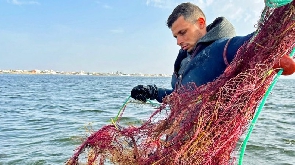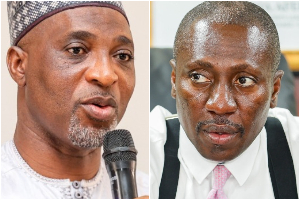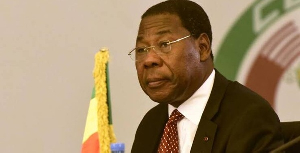As di number of migrants wey dey try reach Europe dey grow so be di number of pipo wey dey die for di Mediterranean.
While European Union officials dey struggle to contain di mass movement, di issues wey dey affect those wey dey run from poverty and oppression dey leave tragic mark for di shores of Tunisia.
As di sun dey creep above di skyline off di shores of im eastern coast, fisherman Oussama Dabbebi begin dey throw im nets inside.
Im face fix on im contents, sake of say sometimes fish no be all wetin e dey find.
"Instead of fish, I sometimes dey get dead bodies. Di first time I fear, den step by step I get use to am. Afta a while to get dead body out of my net come be like to get fish."
Di 30-year-old fisherman, wey wear one dark, hooded sweatshirt and shorts, say e recently find di bodies of 15 migrants for im nets over one three-day period.
"Once I find one baby bodi. How baby dey responsible for anytin? I bin dey cry. For adults e different sake of dey don live. But you know, for di baby, e neva see anytin."
Mr Dabbebi don dey fish dis waters near Tunisia second city of Sfax since e be 10 years old.
Those days e be one of many wey dey cast dia nets, but now e say most fisherman don sell dia boats for plenti moni to pipo smugglers.
"Many times smugglers don offer me unbelievable amounts to sell my boat. I dey always refuse sake of if dey use my boat and pesin drown, I no go ever forgive myself."
One short distance away, one group of migrants from South Sudan – wey don dey hit by conflict, climate shocks and food insecurity since im independence for 2011 - dey waka slowly away from di port.
All of dem dey ultimately hope to reach UK. One explain say dem don reluctantly abandon dia second attempt to cross to Italy sake of an overcrowded boat and worse weather.
"E bin get too many pipo and di boat dey very small. We bin still wan go, but wen we push away from di shore e dey really windy. Too much wind dey."
According to Tunisia National Guard, 13,000 migrants dey forced from dia overcrowded boats near Sfax and return to shore for di first three months of dis year.
Between January and April dis year some 24,000 pipo commot di Tunisian coast inside makeshift boats and make am to Italy, according to di UN refugee agency.
Di kontri now don become di biggest departure point for migrants wey dey try reach Europe. Na Libya hold dis dubious accolade bifo, but violence against migrants and abductions by criminal gangs don make many to travel to Tunisia instead, bifo heading to Europe.
Though di boat wey involve for last week disaster off di Greek coast, wey don leave at least 78 pipo dead and estimate of 500 miss, bin sail from Libya.
Many of dia vessels wey don dey rust and rot lie either half-submerged for water or stack for huge piles next to Sfax port. Forlorn reminders of di dangers of di world deadliest migration route wey pipo sabi.
Another clear reminder fit dey seen for cemetery on for di outskirts of di city.
Rows of graves wey dem freshly dig lie empty for one extended part of di graveyard, dey wait for di next loss sea disaster.
But dey no go dey enough. One new cemetery wey dem entirely dedicate to migrants now dey planned.
Inside just one two-week period earlier dis year, di bodi of more dan 200 migrants dey retrieved from di sea here.
More dan 27,000 dey known to don die as dem try cross di Mediterranean since 2014.
Dis tragedy wey dey rise dey cause great difficulties for di city.
Di director of di regional health authority, Dr Hatem Cherif, say facilities no just dey to deal wit so many deaths.
"Di capacity of di hospital mortuary be maximum of 35 to 40. Dis usually dey enough, but wit all dis influx of bodi, wey dey get worse, really past di numbers we fit take."
Dem bring as many as 250 bodi to di mortuary recently. Dem place most for adjoining cold room, grimly name am di"catastrophe chamber", one on top of each oda. Though Dr Cherif dey keen to point out say all go dey buried for separate, number graves.
Many of those wey die dey unidentified, so DNA tests dey organised and di results dey carefully stored.
Di idea na to enable relatives search for loved ones to see if dem dey buried here, by checking for matches wit dia own DNA.
Three hours' drive north-west of Sfax, some hundred members of Tunisia black minority, many of dem women and children, dey camped for small tents outside di offices of di International Organization for Migration for central Tunis.
All dey evicted from dia homes and sacked from dia jobs for di city afta one dangerous, racist speech for February by di kontri President Kais Saied.
E claim say "plenti" of illegal migrants dey enter di kontri as part of one "criminal" plan to change im demography.
Dis comments wey many see as attempt to attempt to find scapegoats for di kontri economic crisis, wey don lead many desperate Tunisians to become migrants demselves.
As e point to one recent stab wound for arm, one young man wey originally come from Sierra Leone - wey still dey recover from one brutal civil war wey end for 2002 - say dat since di president speech, knife-wielding local youths don assault mani pipo here.
"Some Arab boys come here to attacks us. Di police say dey go keep us secure if we stay here. But if we go outside dis area, we no dey safe."
Dis worry-worry situation and jailing of opponents and erosion of civil rights by di kontri president come show to be less of priority for EU officials dan to curb di flow of migrants.
So far dis year more dan 47,000 migrants don arrive for Italy, one three-fold increase for di same period of last year and demands don grow for make dem do someti.
During one brief visit here earlier dis month one delegation di head of di European Commission lead, Ursula Von der Leyen promise one possible financial support package of nearly 1bn euros ($1bn; £850m).
If e dey approved, around one tenth of dis moni go dey spent on measures to tackle human trafficking.
Last week tragedy off di Greek coast don heighten demands for sometin to dey done.
Yet wit many migrants so desperate and pipo smuggling so profitable for traffickers, to stop di flow of small boats no go dey easy.
Crowds of migrants from all over Africa and parts of di Middle East gada for groups for shaded spots of di streets of Sfax.
Some get di moni to pay for place on trafficker boat, odas live for limbo, unable to even pay for dia food and shelter.
Many don either lost dia passports or pesin don tiff am, while some no get one sake of dem commot dia kontries illegally.
All don hear of di deaths of so many wey try reach Europe, but e be like di desperation kontinu to pass danger, as one young man from Guinea make am clear.
"We no fit go back to our kontri sake ofwe no get moni or passports. I no dey afraid. Idey starve, so much poverty dey [for home] and my parents get nothing. I no wan make my pikins live like dat. I need to go."
Di tragedy be say dis basic human aspiration for better life so often come for dat kind very high price.
BBC Pidgin of Thursday, 22 June 2023
Source: BBC
















